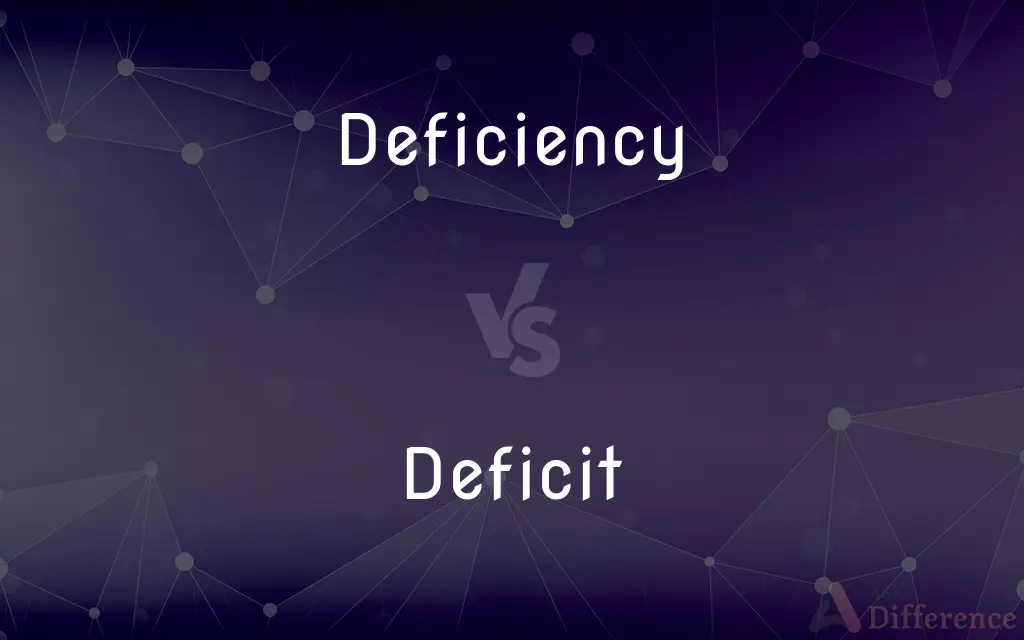Deficiency vs. Deficit — What's the Difference?
By Fiza Rafique & Maham Liaqat — Updated on March 4, 2024
Deficiency involves a lack in quantity or quality, often related to nutrition or skills, whereas deficit implies a shortfall, especially in financial contexts or quantitative measures.

Difference Between Deficiency and Deficit
Table of Contents
ADVERTISEMENT
Key Differences
Deficiency refers to the absence or insufficiency of something necessary, often used in the context of nutrition, skills, or components. For example, vitamin deficiency can lead to health problems. Whereas, deficit describes a situation where expenditures exceed income or where there is a shortfall in what is expected or required, particularly in financial terms, such as a budget deficit indicating financial constraints.
The realm of health and nutrition, deficiency is frequently associated with a lack of essential nutrients, leading to specific health issues like anemia from iron deficiency. On the other hand, deficit is used to describe the lack of a balance, such as a calorie deficit for weight loss, highlighting a quantitative shortfall rather than a qualitative lack.
When discussing skills or abilities, a person may have a deficiency in a certain skill area, indicating they are lacking a particular capability. Conversely, deficit might be used to describe the shortfall in achieving a set target or goal in performance measures, emphasizing the gap between actual and desired outcomes.
Deficiency might describe the lack of necessary resources like water or soil nutrients, affecting ecosystem health. Deficit, in contrast, could refer to the quantitative shortage in rainfall or resource allocation, impacting sustainability and management practices.
The term deficit is more commonly used, referring to situations where spending exceeds revenue, such as in national budgets or personal finances. Deficiency, while less common in strict economic discussions, can refer to the lack of economic resources or inefficiencies within an economic system.
ADVERTISEMENT
Comparison Chart
Context
Nutrition, skills, components
Finance, quantitative measures
Nature
Qualitative lack
Quantitative shortfall
Common Usage
Health (vitamin deficiency), skills (language deficiency)
Economics (budget deficit), energy (calorie deficit)
Implications
Indicates a need for improvement or supplementation
Indicates overspending or a need for budget adjustments
Measurement
Often diagnosed through symptoms or tests
Calculated by comparing numbers (income vs. expenditure)
Compare with Definitions
Deficiency
Insufficiency in skills.
His deficiency in communication hindered his career progress.
Deficit
Financial shortfall.
The government is facing a budget deficit this year.
Deficiency
Inadequacy in quantity or quality.
The project's failure was due to a deficiency in planning.
Deficit
Shortage in expected outcomes.
The project faced a time deficit, delaying its completion.
Deficiency
Absence of essential nutrients.
Vitamin D deficiency is common in regions with limited sunlight.
Deficit
Gap between actual and desired performance.
The team's deficit in goals scored hindered their championship hopes.
Deficiency
Lack of a necessary component.
Iron deficiency can lead to anemia.
Deficit
Excess of expenditures over income.
Their household budget showed a deficit due to unexpected expenses.
Deficiency
Shortage in required elements.
The soil's nutrient deficiency affected crop yield.
Deficit
Lack of balance in quantity.
A calorie deficit is essential for weight loss.
Deficiency
The quality or condition of being deficient; incompleteness or inadequacy.
Deficit
Inadequacy or insufficiency
A deficit in grain production.
Deficiency
A lack or shortage, especially of something essential to health
A nutritional deficiency.
Deficit
A deficiency or impairment in mental or physical functioning.
Deficiency
The state of needing something that is absent or unavailable;
There is a serious lack of insight into the problem
Water is the critical deficiency in desert regions
For want of a nail the shoe was lost
Deficit
Deficiency in amount or quality; a falling short; lack; as, a deficit in taxes, revenue, etc.
Deficiency
Lack of an adequate quantity or number;
The inadequacy of unemployment benefits
Deficit
The property of being an amount by which something is less than expected or required
Common Curiosities
How does a vitamin deficiency differ from a calorie deficit?
A vitamin deficiency is a lack of essential vitamins, affecting health, while a calorie deficit refers to consuming fewer calories than the body expends, affecting weight.
How can a deficit be corrected?
A deficit can be corrected by reducing expenditures, increasing income, or a combination of both.
What causes a deficiency?
A deficiency is often caused by inadequate intake, absorption, or utilization of nutrients or skills.
Is deficiency always related to health?
While commonly associated with health, deficiency can also relate to skills, resources, or components.
Can deficiency be temporary?
Yes, deficiencies can be temporary and corrected through diet, supplements, or skill development.
Can a deficiency in one area lead to a deficit in another?
Yes, for example, a deficiency in investment can lead to a deficit in infrastructure or economic growth.
How do you identify a deficiency in a nutrient?
Nutrient deficiencies are often identified through symptoms, dietary assessments.
Can a country have both a budget deficit and a trade deficit?
Yes, a country can have both a budget deficit (spending more than its revenue) and a trade deficit (importing more than it exports).
What is the impact of a budget deficit on an economy?
A budget deficit can lead to increased national debt and may require cuts in public spending or increased taxes.
Is a deficit always negative?
In financial terms, a deficit is typically seen as negative, but in contexts like weight loss, a calorie deficit is necessary and positive.
What is the difference between a deficiency and a disease?
A deficiency refers to a lack of something necessary, which can lead to diseases, while a disease is a condition that affects the body's structure or function.
How do governments address national deficits?
Governments may address deficits through fiscal policies, such as adjusting spending, borrowing, or altering tax rates.
What strategies can manage a budget deficit?
Strategies include reducing government spending, increasing taxes, or implementing policies to spur economic growth.
Are deficits always related to money?
While commonly financial, deficits can also refer to any situation where there's a shortfall, including time or resources.
Can improving skills reduce deficiencies?
Yes, enhancing skills can reduce deficiencies in those areas, leading to better performance and outcomes.
Share Your Discovery

Previous Comparison
Honor vs. Integrity
Next Comparison
Hawk vs. HorkAuthor Spotlight
Written by
Fiza RafiqueFiza Rafique is a skilled content writer at AskDifference.com, where she meticulously refines and enhances written pieces. Drawing from her vast editorial expertise, Fiza ensures clarity, accuracy, and precision in every article. Passionate about language, she continually seeks to elevate the quality of content for readers worldwide.
Co-written by
Maham Liaqat













































